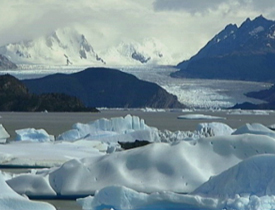Glaciers melt in Argentina's Patagonia, as climate changes
 Evidence of glaciers melting has been released by Greenpeace in Buenos Aires.
Evidence of glaciers melting has been released by Greenpeace in Buenos Aires.

New visual of the effects of climate change was released this week, by the environmental group, Greenpeace in Buenos Aires. New photos of Patagonian glaciers taken by a research team were compared to old ones taken by Catholic missioners in 1928. The evidence is irrefutable: what was a glacier –pure ice- 76 years ago, it is now a beautiful lake.
Greenpeace campaigner Joris Thijssen, said in a press release: “Rising temperatures are causing glaciers to melt all over the world. Here in Patagonia, they are disappearing at a rate of 42 cubic kilometers every year – faster than anywhere else on Earth. There are many reasons for the speed of the retreat and climate change is the trigger of this process."
According to Greenpeace activists, “in recent years melting of the glaciers in Patagonia has accelerated which indicates human induced climate change. From 1995 through 2000 the rate of ice loss from the ice fields more than doubled”.
They also warned about a future increasing in the level of seas: “The sheer volume of melt water from glaciers is causing the sea levels to rise, increasing the risk of flooding in many of the world's coastal areas. It is also starting to cause problems for people who depend on the glaciers for their fresh water supply. This may cause enormous problems in the future given that a third of the world's population – 2 billion people – rely on rivers fed by Himalayan glaciers alone”.
Members of the environmental group said Greenpeace has been touring Patagonia and Chile for four weeks, investigating the extent to which the glaciers and ice-fields there are disappearing. Greenpeace research team's findings confirm that a number of large glaciers, such as the San Quintin and Upsala glaciers, part of the Northern and Southern Patagonian ice-fields, “have significantly thinned and have retreated several kilometers in recent years”.
A recent study by the journal Nature showed that climate change could drive a million of the world's species to extinction as soon as 2050.
"Climate change is a global problem - not only do we risk losing the world's glaciers but we are already witnessing an increased frequency and severity of floods, droughts and storms, loss of coral reefs, rises in sea levels and a rapid spread of diseases such as malaria," added Thijssen.
Greenpeace denounced that climate change is occurring because “we use energy created by fossil fuels –oil, coal and gas. When these fuels are burned, they release carbon dioxide (CO2), a so called 'greenhouse gas' that causes the Earth to warm”.
"We all use energy in our daily lives and so we all have a part to play in solving this global crisis. Instead of relying on fossil fuels for our energy, we must make sure we are provided with clean energy from the sun, wind and small-scale hydro,” concluded Thijssen.
Hernan Etchaleco
Pravda.Ru
Subscribe to Pravda.Ru Telegram channel, Facebook, RSS!


